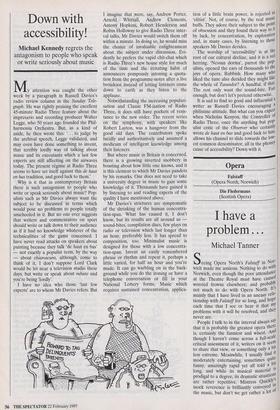Opera
Falstaff (Opera North, Norwich)
I have a problem ...
Michael Tanner
S. eeing Opera North's Falstaff in Nor- wich made me anxious. Nothing to do with Norwich, even though the poor attendance at the Theatre Royal must have caused worried frowns elsewhere; and probably not much to do with Opera North. It 6 mainly that I have lived in an uneasy rela- tionship with Falstaff for so long, and hope each time that I see or hear it that rilY problems with it will be resolved, and they never are.
People I talk to in the interval always say that it is probably the greatest opera therAe is, certainly the funniest and wisest. An though I haven't come across a full-scale critical assessment of it, writers on it seem to share that view, or something only a bit less extreme. Meanwhile, I usually find It moderately entertaining, sometimes quite funny, amazingly rapid yet all told a bit i long, and while its musical material s prodigal to a degree, its dramatic situations are rather repetitive. Mistress QuieklY.5 mock reverence is brilliantly conveyed 111, the music, but don't we get rather a lot 0' it? She does it several times when she visits Falstaff in Act II, Scene i, repeats it to the other wives in the next scene, and does it again when she visits Falstaff in Act III. Most of the local gags are like that, and the overall mood is something I find hard to determine, which may be my fundamental problem. Mellow acceptance of old age, or raging in vivacious terms against the dying of the light? Opera North's in many ways excellent Production leaves the question open, which may be one of its merits. Set in the winter of Falstaff's discontent, practicable snow falls so that he can be pelted with snowballs in the cruel final scene. He is escorted by a small boy as if he were blind, and addresses a snarl to him before the homestretch of the final pseudo-fugue. But at the last moment the snow turns to leaves, as. if spring were following winter, something that doesn't happen in human life. Andrew Shore's Falstaff seems to be of a more irascible than amorous disposition, more interested in his various addictions in order to show himself that he is still capa- ble of coping with them than for the fruits of pursuit. That fits with much of Verdi's music, evidently not with it all. Shore acts with intensity, and brings the same quality his
singing to the point where it moves Into rant. He is the completest performer. The wives divide into those who sing decently but make little dramatic impres- sion, which disappointingly applies to Rita Cullis's Alice; and the superbly mischievous Quickly of Frances McCafferty, whose face is a study in simulated concern, but whose voice is quite lacking in the required fruiti- ness. The young lovers are less appealing than they should be, Fenton already on the way to becoming the Falstaff de ses fours, Paul Daniel's conducting favours the weightier elements in the score. With Die Fledermaus I have no trouble, except for persuading people that it is as masterly as I think it is. They wouldn't be convinced by Nicholas Braithwaite's con- d. ucting of the Overture for Scottish Opera M Glasgow. He is metronomic — how can conductors be like that? — and I feared the worst. As soon as the curtain went up, relief set in and I enjoyed the rest of the evening hugely. With a strong-willed cast, allevidently enjoying themselves, Braith- waite seemed to relax and give them rubato-room. The singers all seem to understand that the only way to give the piece its full value is, as with Cost fan tutte, with which it has a lot in common, to play it straight. Even Richard Coxon's Alfred, a quite marvellous parody of Pavarotti's singing style, believes in his own seductiveness. Only Anne How- ells as Orlofsky induces disquiet: she looks weird, and leaves it unclear as to whether she is calculatedly leaving her gender inde- terminate or just not acting as well as usual. Janis Kelly scores a coup by singing the Czardas in Hungarian, surtitles provid- ed, A major, if negative, cause for rejoicing is the virtual elimination of French, though Act III, the recognition that no party lasts forever, still goes on much too long. The witty translation by David Pountney and Leonard Hancock is the only one I have heard that isn't annoying or self-regarding.



























































 Previous page
Previous page